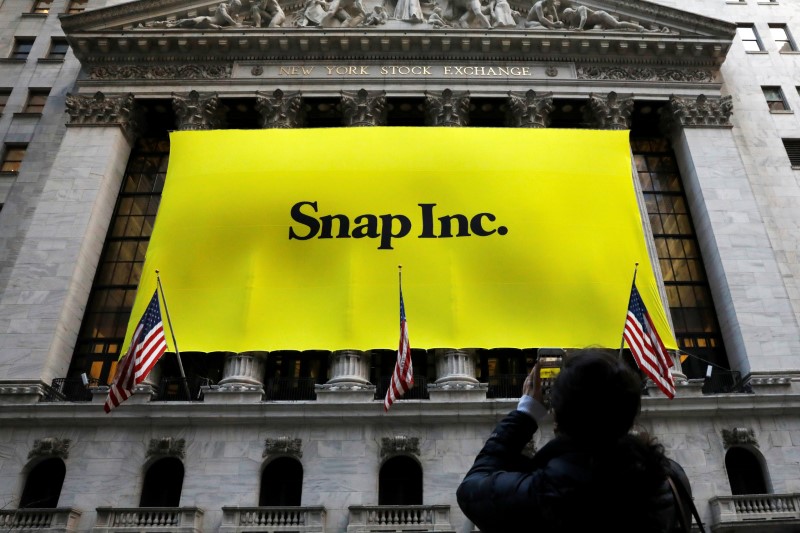Investing.com’s stocks of the week
By Ross Kerber
BOSTON (Reuters) - MSCI Inc has proposed leaving shares of Snap Inc (N:SNAP) and other companies including Eaton Vance Corp (N:EV) out of stock indexes because they lack voting rights, a sign of the rising skepticism facing corporate structures that boost the power of insiders.
In a paper sent to clients in June, MSCI (N:MSCI) said its proposal aimed "to address the growing concern pertaining to listings of only non-voting shares," and invited feedback.
Index providers have been reviewing the issue of whether to include companies with non-voting shares since Snap's IPO in March. MSCI's idea resembles a skeptical view that rival FTSE Russell has already put forward about companies that offer shares with unequal voting rights, even as some technology firms move in that direction.
A third index provider, S&P Dow Jones, has its own review underway, with decisions due in coming weeks.
Being excluded from stock indexes would be a blow to young companies like Snap by making it harder, or impossible, for some big fund managers to buy the stock. Critics including big pension funds worry giving shareholders less say over matters like executive pay or board elections will make corporate leaders less accountable, while some executives say tighter control helps them run their business with a longer-term focus.
Shares in the parent of Snapchat have already been under pressure since its $3.4 billion IPO in March and last week sank below their $17 initial sale price, amid concerns about the popular messaging platform's slowing growth and competition from Facebook Inc . (O:FB)
Under Snap's unusual structure, most power on matters like executive pay or board membership is concentrated with co-founders Evan Spiegel and Robert Murphy.
MSCI and Snap declined to comment. Snap previously said its voting structure would help it "remain a founder-led company" and that the majority of its board is independent.
Index clients include big fund sponsors like BlackRock Inc (N:BLK) and Vanguard Group, who have been critical of the turn away from voting shares but have also bought shares of Snap.
A BlackRock spokesman, Ed Sweeney, declined to comment on the index reviews but pointed to its governance guidelines, which state that "BlackRock supports the concept of equal voting rights for all shareholders."
A Vanguard spokeswoman, Arianna Stefanoni Sherlock, said while Vanguard has concerns about Snap's structure, "We believe companies like Snap cannot be excluded solely on the basis of voting limitations at this time."
In the paper sent to clients, also available on its website, MSCI proposes to leave non-voting shares out of popular products like its U.S. equity indexes if their voting power at a company is less than 25 percent for new constituents, or less than 16.67 percent for existing constituents.
In the case of its All Country World Index (ACWI) (MIWD00000PUS), the paper states, the proposal would keep Snap out of the product, and six non-voting shares would be deleted. The only U.S. company in the group is asset manager Eaton Vance (N:EV), whose publicly traded shares do not include voting rights, a structure in place since 1959.
Eaton Vance spokeswoman Robyn Tice said while it does not wish to be removed from indexes, "we cannot control what they decide to do."
According to the MSCI paper, some companies with both voting and non-voting listed share classes, such as Alphabet (O:GOOGL) (O:GOOG), could remain in the ACWI.
Ken Bertsch, executive director of the Council of Institutional Investors, a trade group for pension funds and other big investors that has been critical of unequal voting rights, said he was encouraged by the MSCI proposal.
Bertsch said the group could accept some concepts like allowing indexes to retain big companies even with unequal voting rights. "We don't want to kick Google or Facebook out of the indexes, it would be way too disruptive. Our concern is to set a limit on this," he said.
The council remains concerned more IPOs may follow Snap's example such as a recent one by meal-kit service Blue Apron Holdings (N:APRN). A spokeswoman for Blue Apron declined to comment.
